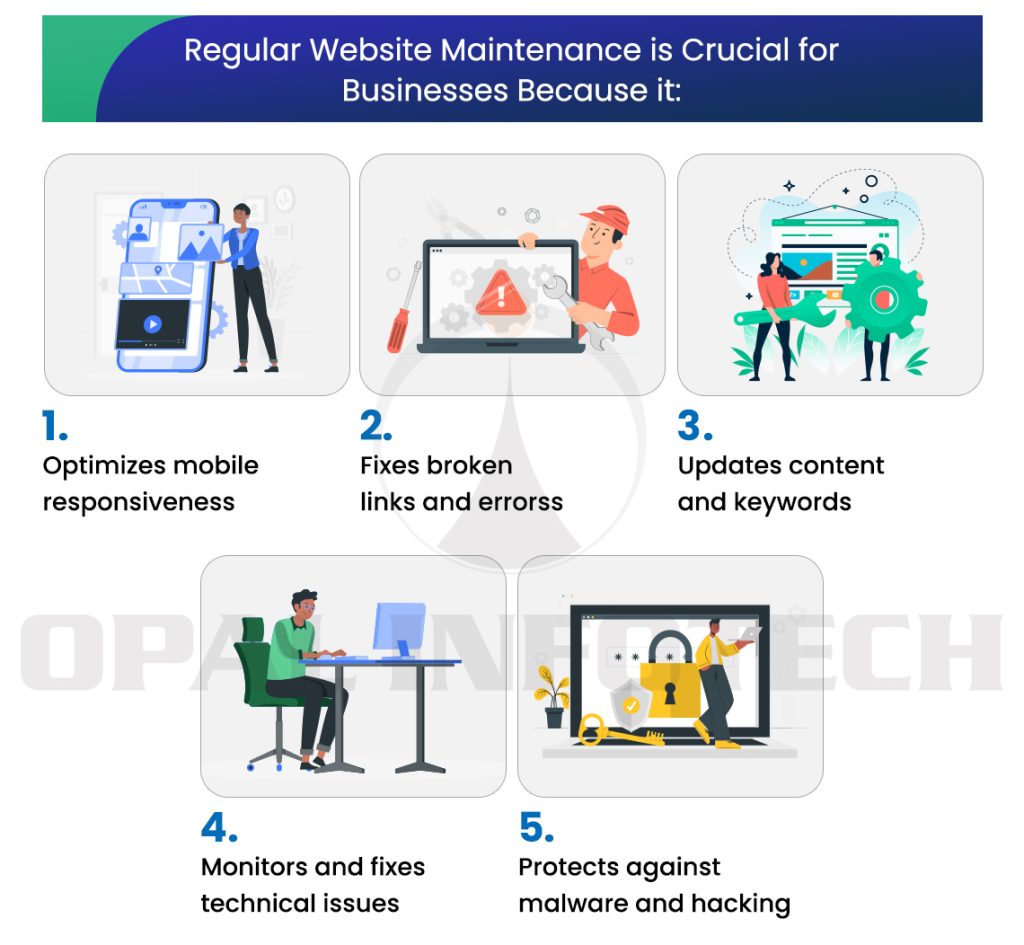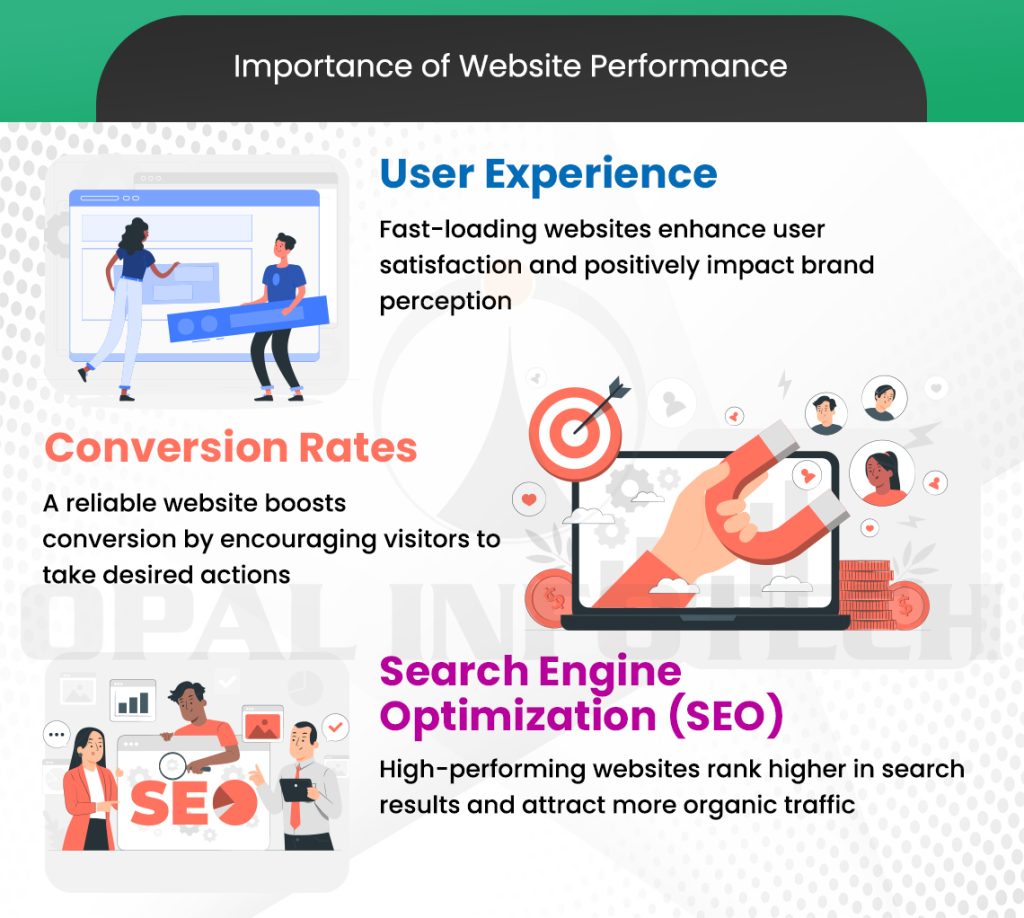In today’s modern era, the significance of keeping a well-maintained website cannot be overstated for businesses and organizations. Regular website maintenance involves the continuous process of updating and optimizing various elements of your website to ensure its smooth operation, security, and performance.
Neglecting website maintenance can lead to various issues, such as security vulnerabilities, poor performance, and a decline in search engine rankings.
Performance Optimization
Website performance plays a vital role in providing a positive user experience. A slow-loading website can frustrate visitors and drive them away. Regular maintenance allows you to optimize your website’s performance by addressing issues that could be slowing it down. This includes optimizing images, minifying code, enabling caching, and improving server response time.
Search Engine Optimization (SEO)
Having an updated website is essential for building a robust online presence in search engine rankings. Search engines tend to favor websites that frequently update their content, as it indicates relevance and credibility. Regular maintenance involves updating and refreshing your website’s content, meta tags, and keywords to align with the latest industry trends and user search queries. Furthermore, monitoring website analytics enables you to identify areas for improvement and make data-driven decisions to enhance your SEO strategy.
User Engagement
Regular website maintenance helps in enhancing user engagement by providing fresh and relevant content. By regularly updating your blog, news section, or product pages, you keep your visitors informed and interested. Additionally, integrating social media buttons and sharing options allows users to easily interact with your content and share it with their networks, further increasing engagement and expanding your reach.
Brand Reputation
Your website serves as a digital representation of your brand. Regular website maintenance is essential for maintaining a consistent brand image and upholding your reputation. Outdated content, broken links, or design inconsistencies can negatively impact how your brand is perceived by visitors. By regularly reviewing and updating your website, you ensure that all elements align with your brand guidelines and reflect your professionalism. This builds trust and credibility among your audience, leading to a positive user experience and potential business growth.
Reasons Why Regular Website Maintenance is Crucial for Businesses?
A website serves as the online face of a company, allowing it to reach a broader audience and generate leads. However, just having a website is insufficient. Regular website maintenance is crucial to ensure optimal performance, functionality, and security.
Optimizing Mobile Responsiveness
Regular website maintenance enables you to review and improve your website’s mobile responsiveness, ensuring that it looks and functions seamlessly on smartphones and tablets. By delivering a mobile-friendly experience, you can cater to a larger audience and improve engagement.
Fixing Broken Links and Errors
Broken links and error pages can frustrate users and negatively impact their perception of your brand. By consistently maintaining your website, you can detect and resolve broken links, update obsolete information, and guarantee the accessibility and error-free functionality of all pages. This meticulous approach contributes to a favorable user experience and enhances the credibility of the website.
Updating Content and Keywords
Fresh and relevant content is a vital component of SEO. Regularly adding fresh content, blog posts, and articles to your website not only benefits your visitors by providing valuable information but also indicates to search engines that your site is active and worthy of indexing. Additionally, reviewing and updating keywords based on industry trends and user behavior helps you stay ahead of the competition and improve your website’s visibility.
Monitoring and Fixing Technical Issues
Websites can encounter technical issues over time, such as broken functionalities, error messages, or compatibility problems. Regular website maintenance allows you to monitor your website’s performance, identify any technical issues, and promptly address them. Whether it’s fixing broken forms, resolving database errors, or optimizing server configurations, proactive maintenance ensures that your website operates smoothly and delivers a seamless user experience.
Protecting Against Malware and Hacking Attempts
Regular website maintenance includes implementing robust security measures, such as installing security plugins, using strong passwords, and performing security audits. By proactively defending against cyber threats, you safeguard your website and the sensitive information of your customers, ensuring their trust and confidence in your business.

Why Regular Website Security is Important for Business?
In today’s modern era of technology, most businesses have websites to reach their customers online. When we talk about website security, we mean protecting the website and its information from people who shouldn’t have access, preventing any harm or misuse. This involves taking different steps and following good practices to make sure the information on the website stays private, intact, and available when needed.
Common Website Security Threats
Several common website security threats pose a significant risk to businesses. There are different types of attacks that can harm websites. One example is malware attacks, where harmful software is put into a website. This lets cybercriminals take advantage of weaknesses and get unauthorized access. Another type is phishing attacks, where scammers pretend to be trustworthy organizations to trick users into giving them important information. Lastly, there are Distributed Denial of Service (DDoS) attacks, which overload a website’s servers, making it impossible for real users to access it.
Essential Website Security Practices and Implementing Website Security Solutions
To maintain robust website security, businesses should follow essential practices. Regular software updates and patches are critical as they often contain security fixes for known vulnerabilities. Additionally, encouraging users to create strong and unique passwords helps prevent unauthorized access. Implementing SSL/TLS encryption secures sensitive information transmitted between the website and users, reducing the risk of interception and unauthorized decryption.
To enhance website security, businesses can also invest in various security solutions. Firewalls act as a barrier between a website and potential threats, filtering incoming and outgoing network traffic. Intrusion Detection and Prevention Systems (IDPS) monitor network traffic for suspicious activity and can block potential attacks. Web Application Firewalls (WAF) specifically target web-based threats, filtering and blocking malicious requests.
Regular Website Backups
In addition to proactive security measures, regular website backups play a vital role in mitigating the impact of security incidents. Backups allow businesses to restore their websites and data in the event of a breach, minimizing downtime and ensuring business continuity. Backups also provide protection against ransomware attacks, where cybercriminals encrypt data and demand a ransom for its release.
Why Regular Website Performance is Crucial for Businesses?
A website serves as the virtual face of a business, acting as a gateway for customers to interact, engage, and transact. However, if your website fails to deliver a seamless user experience due to slow loading times, unresponsive design, or other performance-related issues, it can result in frustrated visitors, high bounce rates, and lost opportunities. Therefore, prioritizing website performance is vital for businesses of all sizes and industries.
Importance of Website Performance
User Experience
Website performance plays a pivotal role in shaping the user experience. Studies have shown that users have little patience for slow-loading websites, with research indicating that nearly 40% of users abandon a website if it takes more than three seconds to load. A smooth and responsive web design enhances user satisfaction, increases engagement, and encourages visitors to explore further, ultimately leading to a positive perception of your brand.
Conversion Rates
A fast and reliable website is instrumental in driving conversions. Whether it’s making a purchase, filling out a contact form, or subscribing to a newsletter, a website with excellent performance increases the likelihood of visitors taking the desired actions. On the other hand, a sluggish website can result in lost conversions, leaving potential customers frustrated and more likely to seek alternatives.
Search Engine Optimization (SEO)
Search engines like Google consider website performance as a crucial ranking factor. A slow website may experience a decline in search engine rankings, resulting in reduced organic traffic and visibility. Conversely, a well-optimized and high-performing website is more likely to rank higher in search engine results, attracting more organic traffic and potential customers.

The Impact of Website Performance on Business Success
Optimizing website performance positively impacts your business in several ways:
Better User Engagement and Retention
A fast and user-friendly website enhances engagement and encourages visitors to stay longer. This increased engagement can lead to higher conversions, repeat visits, and improved customer loyalty.
Improved Conversion Rates
A website that loads quickly and functions seamlessly contributes to improved conversion rates. Users are more likely to complete desired actions, such as making a purchase or submitting a form, when the website performs optimally.
Enhanced SEO Rankings
Search engines prioritize websites with good performance and user experience. By optimizing your website’s performance, you increase the chances of achieving higher rankings in search engine results pages (SERPs). Improved visibility in search results can drive more organic traffic to your website and boost your business’s online presence.
Why User Experience is Important for Regular Website Maintenance?
User experience (UX) plays a vital role in the success of a website. It encompasses various aspects of a user’s interaction with a website, including usability, accessibility, functionality, and overall satisfaction. When it comes to website maintenance, prioritizing user experience is crucial to ensure that visitors have a positive and seamless experience while interacting with your website.
User experience refers to the overall experience a visitor has while interacting with a website. It encompasses various elements, such as the website’s design, navigation, content, responsiveness, and performance. A positive user experience involves providing users with intuitive and seamless interactions, allowing them to easily find information, accomplish tasks, and have an enjoyable experience throughout their journey on the website.
Concluding Website Maintenance
Enhances User Satisfaction
Regular website maintenance ensures that your website functions smoothly, providing users with a seamless experience. By addressing technical issues, broken links, and other potential obstacles, you can prevent user frustration and enhance their satisfaction. A well-maintained website not only meets user expectations but also exceeds them, leading to positive word-of-mouth recommendations and increased user engagement.
Improves Website Performance
Website performance is a critical factor in user experience. A slow-loading website or one that experiences frequent downtime can lead to user dissatisfaction and abandonment. Through regular maintenance, you can optimize the website’s performance by identifying and resolving performance bottlenecks, optimizing code and scripts, and implementing caching and content delivery networks (CDNs). These measures improve page load times, reducing bounce rates and increasing user engagement.











